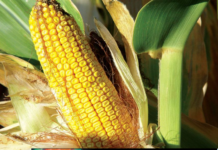Contact: Marsha Boswell, [email protected]
For audio version, visit kswheat.com.
Like many wheat producers, Derek Sawyer, who farms near McPherson and serves as a Kansas Wheat Commissioner, used not to think too much past the bushels and protein levels of the wheat he delivered the elevator. After joining U.S. Wheat Associates (USW) on their November crop quality seminars in South America, he now understands that end-use markets want not just data on protein quality and milling and baking test results, but also a direct connection back to the farmers who grow the wheat they purchase.
“These customers really wanted to hear about quality, and they all had something different they were looking for,” Sawyer said. “It’s a lot more than being able to take bushels of wheat to the elevator and delivering what we think will be shipped and turned into bread — we have to continue working domestically to improve genetics and inputs to grow a high-quality crop that the end-user wants.”
As the export market development organization for the U.S. wheat industry, USW conducts crop quality seminars around the world each fall and winter to provide transparent information to customers and facilitate dialogue about the U.S. wheat supply chain from start to finish. In addition to the series Sawyer attended in South America, USW also held seminars this year in Central America/Caribbean, South Asia, the European Union and North Asia.
Far from a leisurely tourist trip, Sawyer explained the U.S. team, who represented each of the six classes of U.S. wheat, had a whirlwind itinerary from one seminar to the next, flying from city to city and country to country to present to customers in Colombia, Ecuador, Peru and Chile. According to USW, the seminars in Quito (Ecuador), Lima (Peru) and Santiago (Chile) drew attendees that represented more than 90 percent of wheat purchases. In addition to these long-time, loyal customers, other end-users came to listen to the U.S. team, including a set of shrimp and salmon farmers who need tight specifications of hard red winter (HRW) wheat to make their feed pellets sink to maintain the exact right depth for longer feeding periods.
Sawyer served as the “friendly farmer” during these seminars, providing information on Kansas wheat farming operations and how they have changed over time — easy to do since his family’s operation has grown wheat for more than 70 years. In turn, customers asked Sawyer questions about profitability, drought, volatile prices, the future of wheat breeding and more.
“They wanted to meet the farmer that raises the crop they are buying and hear stories they could turn around and tell their customers,” Sawyer said. “A lot of them centered around sustainability or regenerative agriculture, so they wanted to be able to tell their customers that the farmer who grew the wheat cared about the land. As it turns out, wheat is a pretty easy crop to be able to tell that story.”
Transparency is a major advantage for selling U.S. wheat to international customers compared to other competing countries, including taking a deep dive into the data in USW’s crop quality reports and sharing personal perspectives from wheat farmers. Combined with personal relationships established and maintained by USW employees and clearly defined grain grading standards and export procedures, Sawyer explained that these customers know that when they buy a load of wheat from the United States, they know exactly what they will receive.
“Our buyers have stuck with us over the last three years, and it’s only because of the personal relationships we’ve formed,” Sawyer said. “It was truly amazing to see the reception that USW employees got from all the businesses; it showed the trust those buyers have in U.S. wheat. Our markets are truly open around the world because of their efforts.”
Now home and recovered from the jet lag, Sawyer reflected on his role — and the role of Kansas wheat farmers — in promoting not only a crop, but also a way of life.
“It was really satisfying for me to meet customers halfway around the world that really appreciated the value of the wheat I grow,” he said. “And I know it was satisfying for them to meet the farmer that truly cared about growing a valuable commodity and caring for the land my family has farmed for generations.”
Learn more about the entire set of USW’s crop quality seminars and read the full 2023 USW Crop Quality Report at uswheat.org.
###




